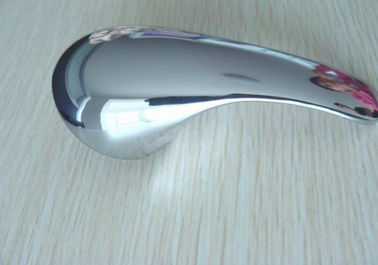
Hard Chrome Plating Chemicals Brightener High Cathode Efficiency KCR-25
-
Highlight
chrome plating brightener
,chrome electroplating chemicals
-
FeaturesIndustrial Grade
-
ItemChemical Auxiliary Agent
-
TypeChrome Plating Brightener
-
ModelKCR-25
-
Place of OriginChina
-
Brand NameFENGFAN
-
Model NumberKCR-25
-
Minimum Order QuantityNegotiable
-
PriceNegotiable
-
Packaging DetailsStandard export packaging
-
Delivery Time15-25 work days
-
Payment TermsL/C, D/A, D/P, T/T, Western Union, MoneyGram
-
Supply Ability200000pcs/day
Hard Chrome Plating Chemicals Brightener High Cathode Efficiency KCR-25
Brightener for KCR-25 Hard Chrome Plating
1. Properties
1. With high cathode efficiency, it may be up to 23%-26%.
2. The current density even over 60A/dm2 is available.
3. The deposition speed for KCR-25 bath is 2-3 times faster than conventional hard chromium process.
4. It is chloride-free, the KCR-25 process dose not cause erosion of the workpiece in low current density area.
5. The micro-hardness of the plating is up to 950HV-1100HV100.
6. The amount of the micro cracks of the plating may be up to 400/cm, so it improves the corrosion resistance ability of the plating.
2. Bath composition & Operation condition
|
|
Operation range |
Standard |
|
Chromium trioxide |
200~275g/L |
250g/L |
|
KCR-25 Catalyst |
|
20ml/L |
|
Sulfuric acid |
2.5~4g/L |
2.7g/L |
|
Temperature |
50~60℃ |
58℃ |
|
Cathode current density(Dk) |
50~75A/dm2 |
60A/dm2 |
|
Anodic current density |
15~30A/dm2 |
30A/dm2 |
3. Preparation
1. Pull water of 2/3 volume into the bath, then heat to 60℃.
2. Add 250g/l anhydrous chromic anhydride, then add 20ml/L KCR-25C catalyst, then stir it thoroughly.
3. Add sulfate acid after it dissolve completely.
4. Prepare anode for the bath, add water to required volume.
5. Adjust the temperature to operation range, then electrolysis for 4~8 hours while stirring, try to product after the bath reaches equilibrium.
4. Equipment
-
Bath: Steel tank lining suitable PVC, or sprayed on vinyl chloride resin, lead plating tank liner should not be used, there should be pumping facilities at the edge of the bath.
-
Rectifier: Rectifier should provide enough amperage and 9-15V DC, ripple rate should be less than 5%.
-
Anode: Suggest use lead tin alloy anode (93% lead, 7% tin), other lead tin alloy or lead antimony alloy may be applicable, auxiliary and conformal anode should also use lead tin alloy or lead antimony alloy.
-
Heating/Cooling: plating bath should be equipped with adequate heating and cooling equipment, heat exchangers and cooling pipes can be used with titanium, Teflon or other fluorocarbons. The liquid in heating and cooling pipe should always flow, so that the temperature distribute evenly. It is better automatic control device to adjust the bath temperature.
-
Circulating stirring: good circulating plating bath can make the chemical composition and temperature distribute evenly. Circulation pump filter material can use with stainless steel or chromic acid-resistant plastic.
5. Supplement
KCR-25 catalyst:4ml/KAH, or add KCR-25 catalyst 2.2L while adding chromium trioxide 100KG. These are just for reference. The actual adding amount depends on brightness of the plating.
6. Impurities
Usually the plating with harmful impurities will also affect the KCR-25 plating, trivalent chromium and excessive impurities reduce conductivity of the bath solution, so the thicker plating surface appears rough. The total impurity content can not exceed 8g/l.
7. Reference Data
1. Deposition rate
|
Current Density (A/dm2) |
Deposition rate (μm/h) |
|
30 |
20-35 |
|
45 |
40-50 |
|
60 |
50-70 |
|
7.5 |
70-90 |
2. Bath density and concentration of chromic anhydride control
|
Chromium trioxide |
Bath density |
Baume degree (15℃) |
Baume degree (60℃) |
|
180 |
1.13 |
16.7 |
16.7 |
|
195 |
1.14 |
17.8 |
15.9 |
|
210 |
1.15 |
18.9 |
17.0 |
|
225 |
1.16 |
20.0 |
18.1 |
|
240 |
1.17 |
21.1 |
19.1 |
|
255 |
1.18 |
22.1 |
20.1 |
|
270 |
1.19 |
23.2 |
21.0 |
|
285 |
1.20 |
24.2 |
21.9 |
|
300 |
1.21 |
25.2 |
22.7 |

